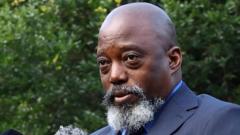The Democratic Republic of Congo's Senate has taken a significant step by revoking the legal immunity of former President Joseph Kabila, paving the way for potential treason charges related to his alleged support for rebel activities in the eastern region of the country.
Joseph Kabila Faces Prosecution After Immunity Removed Over Treason Allegations

Joseph Kabila Faces Prosecution After Immunity Removed Over Treason Allegations
Former President of DR Congo, Joseph Kabila, now vulnerable to legal action following Senate's decision to lift his immunity.
The Senate, in a decisive meeting, voted with nearly 90 votes in favor of prosecuting Kabila, while only five senators opposed the motion. This marks a crucial moment in the long-standing conflict concerning the M23 armed group, which has seized control of multiple towns in the resource-rich eastern DR Congo. Officials have gathered substantial evidence, including documentation and witness testimonies, linking Kabila to these insurgents.
Kabila, who served as president from 2001 to 2019, has remained silent on the charges but has consistently denied any ties to the M23. After his presidency, he was designated a "senator for life" which previously afforded him certain legal protections. However, in response to a request from the military prosecutor, the Senate approved the lifting of this privilege to allow for a formal prosecution.
Currently residing in South Africa, Kabila has stated intentions to return to DR Congo to assist in resolving the ongoing conflict. Reports of his return to Goma, a city overtaken by the M23, were quickly refuted by his political party, the People's Party for Reconstruction and Democracy (PPRD).
The situation intensified when the Congolese government banned the PPRD, accusing it of ambiguous stances towards the M23's occupation of national territory. Justice Minister Mutamba emphasized the expectation for Kabila to return and confront the justice system, asserting that it is imperative he presents his defense.
Experts speculate that a trial involving Kabila could further exacerbate tensions in a country that has faced continuous instability since the emergence of the M23 rebellion in 2012. The PPRD has denounced the legal proceedings against Kabila as a diversion from more pressing national issues.
This unraveling crisis continues to draw attention to the complexities of the conflict in the Democratic Republic of Congo, where legacy issues and contemporary power struggles collide.
Kabila, who served as president from 2001 to 2019, has remained silent on the charges but has consistently denied any ties to the M23. After his presidency, he was designated a "senator for life" which previously afforded him certain legal protections. However, in response to a request from the military prosecutor, the Senate approved the lifting of this privilege to allow for a formal prosecution.
Currently residing in South Africa, Kabila has stated intentions to return to DR Congo to assist in resolving the ongoing conflict. Reports of his return to Goma, a city overtaken by the M23, were quickly refuted by his political party, the People's Party for Reconstruction and Democracy (PPRD).
The situation intensified when the Congolese government banned the PPRD, accusing it of ambiguous stances towards the M23's occupation of national territory. Justice Minister Mutamba emphasized the expectation for Kabila to return and confront the justice system, asserting that it is imperative he presents his defense.
Experts speculate that a trial involving Kabila could further exacerbate tensions in a country that has faced continuous instability since the emergence of the M23 rebellion in 2012. The PPRD has denounced the legal proceedings against Kabila as a diversion from more pressing national issues.
This unraveling crisis continues to draw attention to the complexities of the conflict in the Democratic Republic of Congo, where legacy issues and contemporary power struggles collide.


















